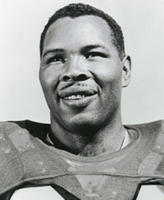Perry: Game I'll Never Forget
 Joe Perry: The Game I'll Never Forget
Joe Perry: The Game I'll Never ForgetFootball Digest - March 2003
Whenever I'm asked about the most memorable game of my career, I think back to October 27, 1957.Our team, the San Francisco 49ers, was playing the Chicago Bears at home at Kezar Stadium, and all of the sudden we heard this big commotion in the stands where the owners sat. All of the players from the Bears and the 49ers heard it out on the field--you could hear people crying in the stands.
We suspected that something had happened to our owner, Tony Morabito. He had been in bad health in the years leading up to that day. Doctors had tried to convince him to get out of football because the stress and emotion weren't good for his health. Then someone--I don't recall if it was our coach, Frankie Albert, or who it was--came down at halftime and confirmed our greatest fears: We were told that Mr. Morabito had suffered a heart attack and died.
Obviously, it was a huge shock to the team. We didn't know how to react. It was just shocking to get this news in the middle of a football game.
Everyone liked Mr. Morabito. He was a fair man. I can remember that I never signed a contract until the year he had his heart attack. He always just signed it and sent it in to the league; we would shake hands on it, He was the type of owner you would see all the time. He was upbeat, in his own manner. He would put his head on the block for you--an honest guy from the day he bought the team in 1946.
He was always a hands-on type of owner. He would kill you if you said something bad about one of his players. If he heard you talking about one of his players, you had better have been ready to fight. I think that's why his players liked him so much.
He was also pretty smart from a football perspective, helping to put together a good team. In those years, the 49ers were always bridesmaids. We never won the title, but we won a lot of games and got close to a championship a few times. We would always miss out by a game here or there.
The strength of our team was the backfield, with Y.A. Tittle at quarterback and John Henry Johnson, Hugh McElhenny, and I running the ball. They called us "the Million Dollar Backfield."
Every one of us ended up in the Hall of Fame, but when we were playing, the egos were never part of it. We got along great--we were the greatest of friends. McElhenny, John Henry, and I would switch around all the time. There were never any ill feelings--there wasn't a sense of competition among us.
I remember this one game in Detroit. The Lions were physically kicking the hell out of us. John Henry was the only guy making any yards. Tittle was calling the plays--back then, quarterbacks called their own plays--and he came into the huddle and said, "I don't know what to call. What do you want to call?" McElhenny spoke up, saying, "Why don't you give the ball to John Henry? He's the only one who's doing anything." That shows you the kind of unselfishness we had on that team.
And although John Henry had gone to Detroit by 1957, the backfield was still our strength, which isn't to say we didn't have some other great players on the team. Bob St. Clair was a great, hard-nosed tackle, and Leo Nomellini was a Hall of Fame defensive tackle. In addition, receivers Billy Wilson and R.C. Owens were important parts of the team because they balanced out the offense. Billy led the league in receptions that year, and R.C., a former basketball player, would outjump the defensive backs for the ball. It was sort of like he was going up for an alley-oop in basketball. Teams couldn't figure out how to defend him.
So at halftime of that fateful game against the Bears, we were all kind of stunned. The Bears were leading by 10 points. They were kicking the hell out of us--not so much scorewise, but physically on the field. They were mauling us.
I don't remember if anything was said about Mr. Morabito, but I'm sure there was a feeling in the locker room that we wanted to go out there in the second half of the game and win it for him. That was the least we could do.
Well, we did it. It was like a Hollywood scriptwriter had drawn it up. We came back and won the game, 21-17. I don't remember anything about who scored or who did what or how many yards anyone had or how the game ended. What I do remember is having this bittersweet feeling. We had won the game--staged that big rally--for Mr. Morabito, but then it really began to sink in that we had lost him. We all began to feel terrible, just terrible. Heartbroken, really.
Later in the season, it turned out that the Chicago game was one we had needed to win. Even though we had gone through a slump right in the middle of the season in which we had lost three straight games, we ended up tied with the Lions for the Western Conference regular-season title.
We had to play a one-game playoff to see who would go to the title game. It was kind of weird because we had a big lead, but Detroit rallied to win--sort of like how we had come back to beat the Bears earlier in the season.
Post a Comment